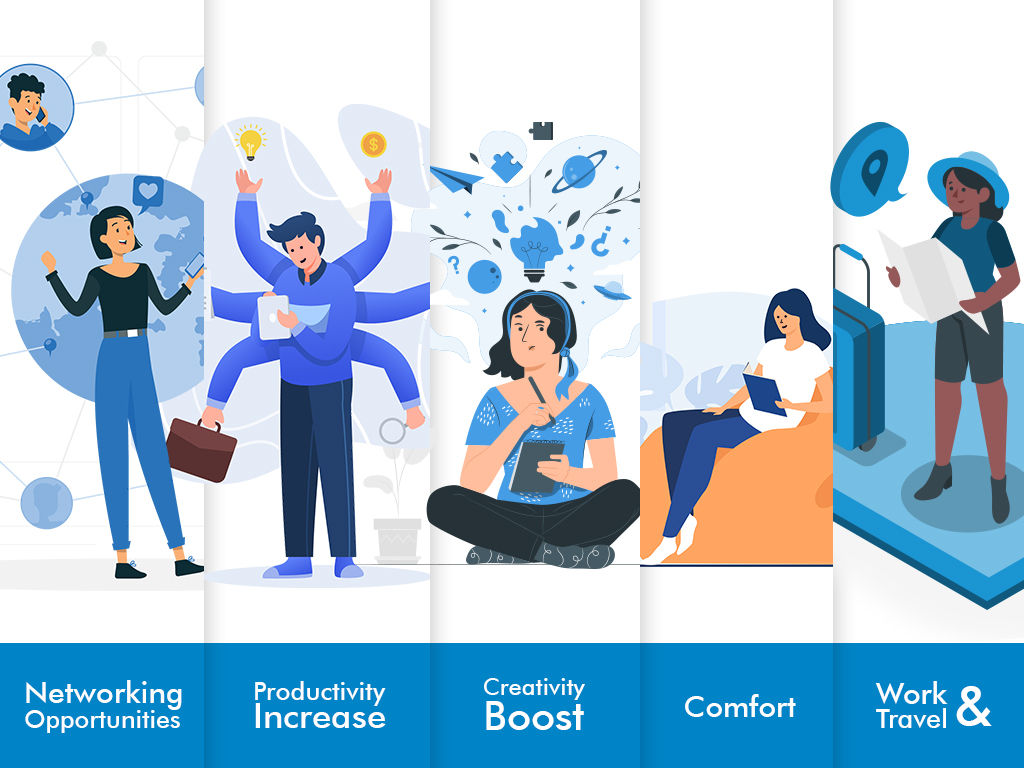When you really focus on what you are doing and work hard, you will be surprised at how much you can get done. Something that should take a day can be done in half a day when you cut your distractions and concentrate. The more you pay attention to these techniques of productivity, the more you realize that working smarter holds the secret key to efficiently getting work done than working harder. Hard work is putting in exhausting hours of work for doing a certain task whereas Smart work refers to finding effective and efficient ways to complete one or more tasks while also managing time and quality. Working smarter boosts creativity, productivity and saves a lot of energy for the things that really matter, like your family, friends etc..,. Hard work means spending strenuous hours to complete your work without any shortcuts. It definitely gives results but the process is long and pressurized. Nowadays when people are more used to remote working, it’s important to understand the benefits of Networking. That’s where the coworking community comes into picture. There are so many advantages of coworking spaces. When you meet diverse people, ideas are generated. Smart work would produce the same results but with proper prioritizing and planning of tasks. You should not live to work instead work to live. Keeping your health in the first place, planning your tasks, and testing out alternate ways to approach your tasks makes you both happier overall and more productive. Coworking space provides such a flexible environment to work which is so beneficial for startups.

You might have innovative and creative business ideas, but if you don’t have the right organization and the fundamental productive habits developed, it’s very likely for it to not to be perform or executed in an inefficient way or even not being done at all. Although a bright idea is more likely to boom into a big business than a simply good idea, a decent idea though simple which is mindfully executed will most likely end up being successful and having a big business community. When someone starts a new project, they usually do it with a very few resources, with less amount of money and with little time available. One major benefit of working in a coworking space is that you get to save both. Even if you commit yourself to the project around the clock, at the start you’ll need to take different roles, and each one of them would require an important commitment. If you’re lucky enough to have a small team you can delegate some of the tasks, but managing that team, and delegating and prioritizing tasks will also be your responsibility. That’s where business networking plays an important role. Smart entrepreneurs tend to be prompt, patient, mentally ready, creative, flexible, efficient, well groomed in their appearance, passionate, elegant, sophisticated, current and charismatic. Smart can be defined as the summation of various characteristics expressing itself through a person’s influence on the world. Entrepreneurs are extremely smart, they have thoughts way too ahead of others, and can find solutions even when others are unable to. Despite the fact that most entrepreneurs have high Intelligent Quotients. Complex problem solving ability can be said to be the core of IQ. There is also a relation between complex problem solving ability and creative solutions that entrepreneurs are known best for. New studies are coming out that show the “executive network” (the part of the brain responsible for complex problem solving) is not the same as the “executive function” of focused problem solving. Yet, people with unfocused problem solving skills found to have superior intelligence instead of the rest of the average. Many entrepreneurs start a business, ignoring the risks involved or don’t even bother to figure them out. Some entrepreneurs get lucky, but most of them fail. Some entrepreneurs fail a few times and gain experience and eventually become a better entrepreneur. But experience is not intelligence. Meanwhile, people who are more intelligent are handicapped by fear of risks and end up never starting a business. This is not to say that there are many entrepreneurs who are not intelligent. Some of them are extremely intelligent. But the majority is average or below. Just think of all the failed startups, small scale businesses in your town, and products or services that make no sense. The highest possible risk of failure faced by an entrepreneur is a poor execution of the plans. Planning is usually not the problem. Not even the ideas. At last, it’s the market that decides if your idea is good enough or not to sustain. There must be a good market and enough customers willing to pay for it, so the business you’re going to create will be successful and profitable. In any case, if the original idea is not good enough to penetrate the market, a good execution of the plan should help you notice the issue quickly, and let you create changes on that idea according to the needs of potential clients. For example, you can find that, in addition to programming, analyzing, researching and designing, you have to manage a website, write articles for the blog, support users, search for investors, keep your brand active in social networking platforms, and conduct marketing campaigns. You meet various like-minded people in a shared workspace and this is one of the advantages of coworking space. At the end of this, you would surely want to spend some time with your loved ones (family and friends), along with making time for yourself, enjoying your hobbies.
Read also: “How Coworking Spaces Help Remote Companies & Workers”

Here are 5 techniques that can help you to become to become a smart entrepreneur:
1 . Say Yes to Innovation and Creativity:
This is the proper method to become a smart entrepreneur. If you find any forum, meetings, or any website where topics related creativity and innovation; then, join them. Subscribe them and get some notifications, business meetings and start networking with them. Some small creative and innovative ideas make your mind more creative automatically. So, you’ve to prepare yourself for all innovation and creativity based talent.
2. Keep Track of Short-Term and Long-Term Goals:
The importance of measurable milestones cannot be overemphasized. And knowing the difference between short-term goals and long-term goals is vital. They measure progress weekly or monthly to make sure the team is on track to achieve the long-term goal of their businesses
3. Steps Out of your Comfort Zones on a Regular Basis:
Successful entrepreneurs always seek new challenges. Without new challenges, they feel bored and sometimes stagnant. Your comfort zone may feel soothing and safe but you need to push yourself out of the zone. Stretch your personal boundaries, network and connect with people who inspire you and take a unique approach to how you work to achieve more.
4. Getting Work Done Smarter and Faster not Harder:
You should strive to work smarter, not harder. Smart entrepreneurs create complex and realistic schedules which they will actually achieve within a given period. They enhance their productivity by tools that can make them achieve more without necessarily working harder. Enhance your productivity by creating a to-do list and limiting the percentage of new items you add to your list of things to do every day. Evaluate yourself by how you get things instead of the time it takes to urge them done.

5. Take Calculated Risks:
Calculated risks are taken by your mindset and some real data & proofs. You’ve to get education, knowledge, right experience and must read more and more books to become a right risk taker. Always try to learn and be sure of the subject in which you are going to take risks. You have to meet new people who can guide you and share those personal experiences in the field you are working in.
Execution depends on your personal organization. To develop your business idea you must give attention on to the things that are important and put the right actions at the right moment, and that can’t be done without previous organization. And it’s not about having everything in its place, but about having a technique in place to help you make decisions and advance in every project. New things will keep on come up, some distractions, and some tasks that seem more vital than they truly are. That’s the reason, in addition to consistency, self-discipline and passion for what you’re doing, you also mandatorily need a system that helps you concentrate on what’s vital.
There are so many personal organization systems, almost as many as people on earth. But there’s one system that, throughout the years, has proven to work better than the others. It’s called Getting Things Done (GTD for short). GTD is a personal management system suitable for any person who’s looking to enhance their effectiveness at work and in their personal lives and, at the same time, remove the stress which provokes doing a lot of things. That’s why it is perfect for any person who is in an entrepreneurship venture. It’s explained in detail below:
- GTD encourages you to focus on everything that goes on in your head, including any ideas that you have regarding new business ventures. This is vital for an entrepreneur. You may different ideas to enhance your product or service, to make it stand out in the market, to make it more reachable to your target audience or market, and even if it’s not the right time to carry them out, still you can store them in the “Maybe or someday” list so you can go back to them in the future when needed.
- GTD helps you to plan and execute your projects in a natural way, starting from the purpose and action defining you should take. The GTD’s idea is to make the way clear and make the process of generating ideas and organizing them out mentally. GTD pushes you to advance each day because you’re constantly asking yourself “what’s next?”
- GTD does not only define your flow of work to manage your day to day life, but it also works with the levels of angles that help you know the significance of your tasks on the long run, and your areas of responsibility. It’s really usual that sometimes you put aside the tasks that are vital to do for the task you enjoy doing the most. As an entrepreneur you need to maintain equilibrium between your every day or short term goals and your long term goals, and that’s where GTD can best help you.
- GTD helps you to make immediate decisions at the moment, when things come up, not when there’s an issue or crisis about it. This allows you to immediately respond to the changes that will inevitably occur in your planning. There will be many instances wherein you need to change or adjust the trajectory of your startup so as not to lose opportunities for growth and development.
- GTD doesn’t distinguish between work and personal life, and that is essential not to burn yourself out. If you’ve taken a venture of starting your own business, it must be to live better in every way.
With GTD you can do everything fundamental to launch your project in an effective, efficient and calm way, having the mindset that everything’s under control. You may not be able to achieve this the first time you try — but by practice and changing some habits takes time and effort — but it’s worth the change. To achieve in any field, you have to work for it. We all have dreams. All people have the desire to do or to achieve something from life and work. If you work for money then, someone else or your head will get his dream achieved. Your dream should not be based on money but, it can be that your dreams can be achieved by making money. But, helping others with innovative and creative products will make your dreams successful. When you’re an entrepreneur, you naturally be “on” at all times. However, this can bring down your creativity and may have an effect on your effectiveness. Take time for yourself and make your mind calm – your mind (and business) will thank you.
